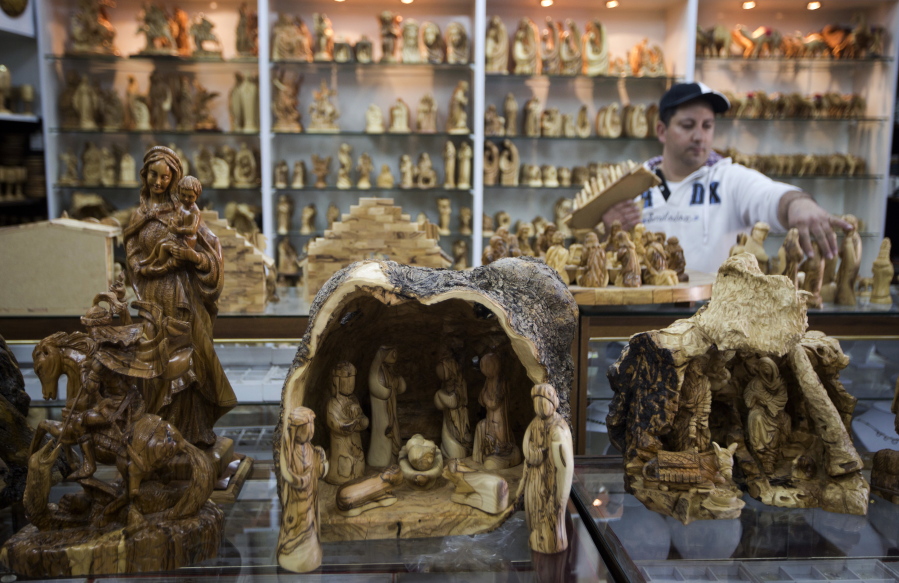BETHLEHEM, West Bank — Christmas is approaching and pilgrims and tourists have begun to arrive, crowding the souvenir shops that line the narrow streets and alleys of Bethlehem, the biblical town revered as Jesus’ birthplace.
But when visitors choose to take a piece of the Holy Land back home with them, they better check the labels. Many souvenirs — including the West Bank town’s trademark rosary beads — are imported from abroad, mainly China.
A small number of souvenir shops are now trying to fight the trend, stocking their shelves almost exclusively with locally made products. Shopkeepers say that while their wares may be more expensive, the quality is much better and they give an important boost to the struggling economy.
“I’ve got nothing that is made overseas except for one thing, that’s the magnets,” said Bassem Giacaman, owner of the Blessings Gift Shop and The Olive Wood Factory. “Everything else is made locally so I can keep the local economy working.”
Some 120,000 people are expected to visit the Holy Land this holiday season, half of them Christian, according to Israel’s Tourism Ministry.
Many will visit Bethlehem, where globalization has left its imprint like everywhere else. Foreign-made crafts, especially Chinese ones, have come to represent a big part of the market here, including Christmas souvenirs. While there are no official statistics, local officials and businessmen estimate that nearly half of the products are imported.
Giacaman keeps just a few imported products in his store, most of them hidden in a small box beneath a counter. He takes them out to show customers and compare them to Palestinian-made ones.
“This is a plastic Jesus baby made in China and this is a ceramic one made in Bethlehem, and these are the olive wood rosaries that I make and the Chinese ones,” he said, proudly showing what he said was the superior craftsmanship of the locally made goods.
Bethlehem is in the West Bank, occupied territory the Palestinians hope will be part of their future state. Tourism remains strong, but the rest of the economy has long languished, in part because of Israeli restrictions. Tourists must pass through a checkpoint in Israel’s separation barrier to reach the town.
The “Visit Palestine Center,” located just a few hundred yards from The Church of the Nativity, promotes a “Made in Palestine” label.
“There’s a big influx of imported products and a lot of traditional crafts are declining gradually,” said Samy Khoury, the center’s founder and general manager.
The Visit Palestine Center works with nearly 100 workshops and home-based artisans throughout the Palestinian territories and in Palestinian refugee camps in Jordan.
It features Palestinian traditional crafts, including Christmas-related ones like olive wood rosaries and mother of pearl ornaments. The center takes a fair trade approach to its business.
Trying to sell only Palestinian-made products comes with challenges.
“Maintaining consistency and quality, the right lead time, figuring how much production capacity the producers can give” are some of them, explained Khoury.
Then there’s the issue of price.
Maher Canawati, owner of the Three Arches souvenir shop, sells locally made gifts and even has a wood workshop in the back. But he keeps room for imports as well.
“A dozen of made-in-China rosaries sell for $4 while a dozen of locally made sell for $25,” he said. “The made-in-China Jesus babies sell for $20 and the Bethlehem ones sell for $64.”



